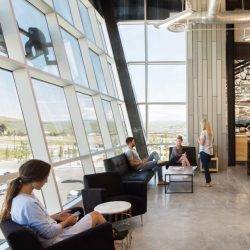July 20, 2018
White Paper: the magic of disruption and what it means for the workplace
 In a 1973 essay called Hazards of Prophecy: The Failure of Imagination, the science fiction writer Arthur C Clarke sets out Three Laws regarding our relationship with technology. Only the third of these is well remembered these days:. Any sufficiently advanced technology is indistinguishable from magic. He was one of the first writers to coin the sort of law that have now become commonplace on the subject of the way our world, including the workplace, can be disrupted by technological developments. They include a corollary to Clarke’s: Any technology distinguishable from magic is insufficiently advanced (Gehm’s Law)
In a 1973 essay called Hazards of Prophecy: The Failure of Imagination, the science fiction writer Arthur C Clarke sets out Three Laws regarding our relationship with technology. Only the third of these is well remembered these days:. Any sufficiently advanced technology is indistinguishable from magic. He was one of the first writers to coin the sort of law that have now become commonplace on the subject of the way our world, including the workplace, can be disrupted by technological developments. They include a corollary to Clarke’s: Any technology distinguishable from magic is insufficiently advanced (Gehm’s Law)





















 A major global report has revealed a lack of confidence in data is limiting corporate success in the emerging era of robotics and automation. The global research launched by Qlik, has revealed an escalating skills gap preventing business decision-makers asking the right questions of data and machines. Despite
A major global report has revealed a lack of confidence in data is limiting corporate success in the emerging era of robotics and automation. The global research launched by Qlik, has revealed an escalating skills gap preventing business decision-makers asking the right questions of data and machines. Despite 
 The digital era, ageing populations, skills shortages, and unpredictable political and economic contexts are persuading multinationals to focus more on mobile talent, new ways of working and assessing the cost of expatriate packages for international employees that are critical to the future of work. This is according to Mercer’s 24th annual Cost of Living Survey which reveals that factors such as instability of housing markets and fluctuating inflation, currencies and prices for goods and services, are impacting the cost of doing business in various cities around the world. UK cities have significantly risen in the ranking this year.
The digital era, ageing populations, skills shortages, and unpredictable political and economic contexts are persuading multinationals to focus more on mobile talent, new ways of working and assessing the cost of expatriate packages for international employees that are critical to the future of work. This is according to Mercer’s 24th annual Cost of Living Survey which reveals that factors such as instability of housing markets and fluctuating inflation, currencies and prices for goods and services, are impacting the cost of doing business in various cities around the world. UK cities have significantly risen in the ranking this year. 












July 17, 2018
Video: Arthur C Clarke predicts remote and flexible working in 1964
by Mark Eltringham • Comment, Technology, Workplace, Workplace design
(more…)